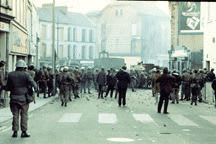Until the very final scene of this reconstruction, one's natural faith in the most traditional British institutions is left in tatters.
Bloody Sunday occurred in January 1972 and it took fully 32 years for anything like a proper inquiry into the events that left thirteen protesters dead to be completed.
There was an inquiry at the time into these events but with the gift of hindsight offered by its successor, it is difficult to regard it as anything but the Widgery whitewash. Soldiers happily lied to save themselves and by extension, the British Army that employed them and, it is implied, told them what to say and what not to.
There was a general feeling of relief when it was announced in 1998 that a second inquiry would take place chaired by Lord Saville, played here by Alan Parnaby. Surely this time, the truth would come out and the dead would finally be able to rest in peace, fully exonerated.
This reconstruction is the latest in what is becoming a long line created by Richard Norton-Taylor and directed by Nicolas Kent at the Tricycle. They have been forced to condense down an inquiry that lasted four-and-a-half years into two-and-a-half hours. Inevitably, questions will be asked about the balance of the reconstruction after such heavy editing. Indeed, of the 921 witnesses who appeared before the inquiry, only twelve are represented here.
The first part is entirely devoted to the testaments of protesters and bystanders who were in the centre of Derry on the fateful day. These include a priest who subsequently became a bishop, a steward whose evidence seems deeply unreliable despite his dry sense of humour and MP Bernadette McAliskey whose distrust of the whole process was eventually belied by the conclusions that were reached.
All of this can be rather dry, although it does paint a background in which unarmed rioters and innocent bystanders were slaughtered by young soldiers without cause.
Once the British Army takes centre-stage things hot up. This is not least because the most distinguished generals, particularly Michael Cochrane's General Sir Robert Ford (note the knighthood) happily admit to perjury. Raising chuckles from the audience, they effortlessly demonstrate that they were short on intelligence in every sense. Together with the ordinary Tommies, they also seem to suffer horribly from the affliction of collective memory loss.
At the end of the evidence given by Soldier F (Charles Lawson), a man whose amnesia exceeds that of all of his colleagues, the case seems to be proven as he finally confesses to what can only be called murder. How else is it possible to describe the shooting of civilians when not a weapon was in sight nor a shot fired from the other side?
Norton-Taylor saves a twist for the tail end of the reconstruction. He brings in a man called Reg Tester who, despite being at the IRA quartermaster in charge of weapons on the day, does not in Michael Cochrane's representation have an Irish accent.
In contrast to all of the evidence presented by the other eleven witnesses, from both sides of the great divide, he admits that the IRA provided weapons and that shots were in fact fired, although it is not clear at what point in the proceedings.
The results of the Saville inquiry will not be published until later this year or early next. On the balance of evidence provided in this reconstruction, it is likely to be condemnatory of the British Army and by extension, of the investigation carried out by Lord Widgery a few months after the event.
However, on the basis that the information provided by Tester in early 2004 is examined more closely and proved to be accurate, the £155 million spent to obtain the truth this time around might just result in the same conclusion as its predecessor.
In productions of this type, the actors need to be on the ball but it is rarely necessary to single out one or another from such a large cast. Perhaps it is enough to remark that the Cusack family seems to be taking over London theatre. In the space of five days, this reviewer has seen three of the sisters on an assortment of stages, including Sorcha playing Bernadette McAliskey in this production and a fourth in an audience at a different theatre.
Bloody Sunday is another worthy addition to the Tricycle's Verbatim Inquiry series. It has brought an important event into the public domain in a digestible form and is as professionally produced as ever. The only question this time is whether the editing has fairly represented the balance of the case on both sides?
This review originally appeared on Theatreworld in a slightly different version
